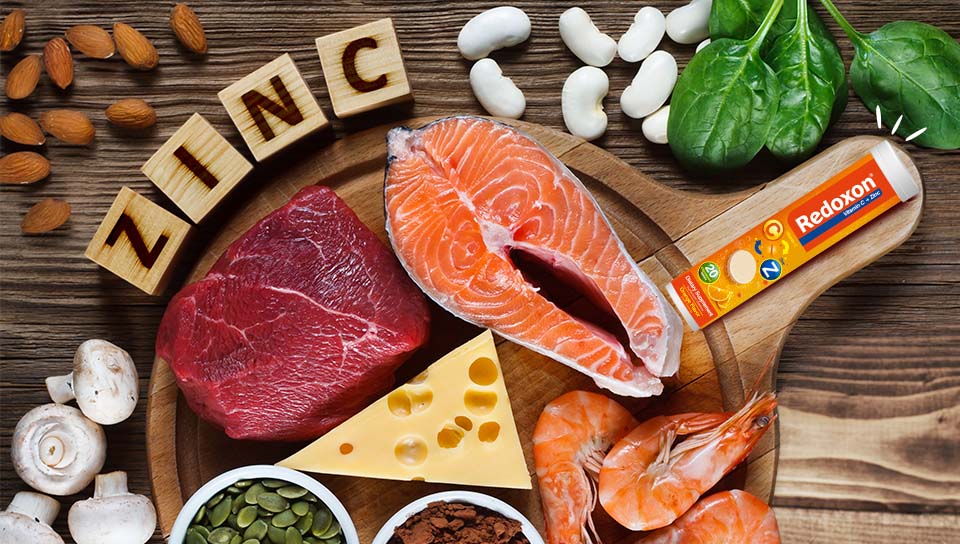Functions and Benefits of Zinc
Sep 15 2020


Zinc deficiency can be responsible for many conditions, such as fatigue, colds, and lack of memory, so it’s important to become familiar with the properties of Zinc and the symptoms of a Zinc deficiency.
Zinc (the second ingredient in Redoxon®) is an important mineral for the body, as it plays a key role in assisting more than a hundred enzymes present in all fundamental biochemical reactions of the body. It also has a direct effect on growth, neurological development, and the immune system.
A small amount Zinc is naturally present in the body, but it is small enough to necessitate obtaining more of it through certain foods and vitamin supplements in order to enjoy all its benefits.
ZINC FUNCTIONS
- Promotes proper functioning of the nervous system
- Has a substantial impact on children’s growth, since it’s involved in the development and mineralization of the bones
- Helps to keep the arteries clean, so it’s recommended to people with high cholesterol or cardiovascular issues
- Strengthens the immune system, making it difficult for harmful microorganisms to enter the body
- Essential for the proper development of the ovaries and testicles
- Facilitates proper functioning of the senses of smell and taste
- Helps heal wounds and prevents acne
- Improves insulin sensitivity
- Helps us better absorb nutrients and fight heartburn
- Strong natural antioxidant, since it helps eliminate free radicals in the body and boosts elasticity in the skin
- Helps keep healthy the pigmented tissues of the eyes, nails, hair, bones, and muscles.
- Although it doesn’t cure cancer, it can decrease the chances of developing it, and a Zinc deficiency can cause tumors
CAUSES OF ZINC DEFICIENCY
- Stress, as it diminishes your body’s Zinc content three times faster than any other condition
- Cardiovascular disease or hypertension
- Diabetes
- Kidney disease
- High intake of medicines or vitamin B6
- Irregular periods
- Serious diseases
- Anemia
- Infections
- Alcoholism
SYMPTOMS OF ZINC DEFICIENCY
Zinc deficiency is a serious issue attributable to things like our eating habits, lifestyle, and the amount of medicine we take. Low zinc levels make us more susceptible to illnesses. Some symptoms of zinc deficiency include:
- White spots/smudges on nails
- Dermatitis and acne
- Frequent colds or flu
- Delayed growth and development in children
- Hair loss
- Chronic fatigue
- Behavioral disorders or changes in mood
- Increase in cholesterol levels
- Stretch marks
- Learning difficulties and poor academic performance
- Memory loss
- Issues with vision, smell, or taste
- Infertility, erectile dysfunction, and problems with libido
- Anemia
FOODS THAT CONTAIN ZINC
- Legumes
- Seeds and dry fruits
- Wheat germ and whole grains
- Ginger
- White fish, oysters, and other seafood
- White and red meat
- Liver
- Bee pollen
- Leafy vegetables (spinach, lettuce, Brussels sprouts, etc.)
- Bananas
- Cucumber
GROUPS THAT REQUIRE LARGE AMOUNTS OF DAILY ZINC
- Babies, children, and the elderly
- Women who are pregnant or nursing
- People with celiac disease, Crohn’s disease, ulcerative colitis, or poor intestinal absorption
- Those with a weak immune system
- Vegetarians and vegans
- Malnourished people and those with eating disorders
- Alcoholics
- People who have recently undergone surgery
Clearly, zinc is highly essential for us to feel healthy and for our body to function well. In fact, it’s one of the most important minerals, second only to iron. Although a zinc deficiency is serious, zinc must be ingested in small quantities (it’s considered a micronutrient), which is why we need to choose the right nutritional supplement to ingest the daily recommended amount of zinc.
Redoxon® effervescent tablets have the perfect amount of Vitamin C and Zinc that our body needs, boosting your energy in order to successfully go about your day.
REFERENCES
- GON. (2017). Zinc – Propiedades y beneficios en nuestra dieta. World Health Design. Retrieved from https://worldhealthdesign.com/la-importancia-del-zinc-en-nuestra-dieta/
- Papa Pintor, Y. (2019). Descubre las propiedades y beneficios del zinc. Mejor con Salud. Retrieved from https://mejorconsalud.com/descubre-las-propiedades-y-beneficios-del-zinc/
- Sha Wellness Clinic. (2015). What is Zinc? Function and benefits. Shamagazine. Retrieved from https://shawellnessclinic.com/es/shamagazine/que-es-el-zinc-funciones-y-beneficios/







